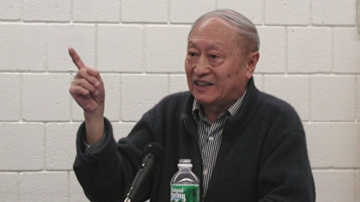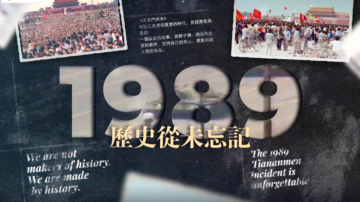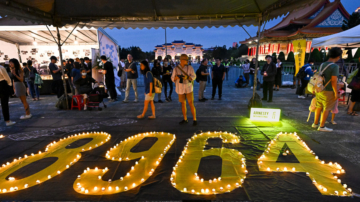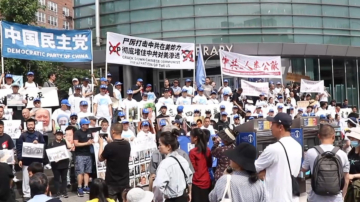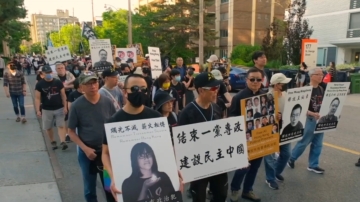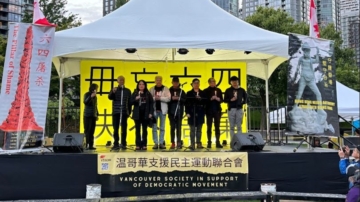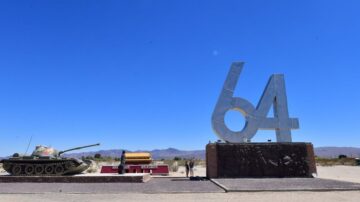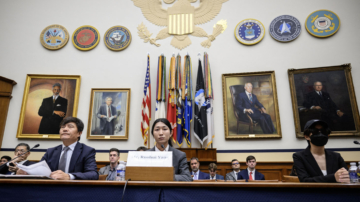【新唐人2012年9月18日訊】原《人民日報》總編輯、社長胡績偉9月16號上午在北京逝世。胡績偉一生追求新聞自由,曾大力推動中國新聞法的起草和制定,晚年又呼籲廢除中國新聞預審制度。他在病重時,還託人帶話給友人,呼籲十八大平反「六四」。
胡績偉從1952年起在《人民日報》社工作,先後擔任副總編輯、總編輯、社長等。文革中他受過批鬥,76年復職,以後也多次遭到整肅。 1983年9月,胡績偉受到清除資產階級精神污染運動的牽連,辭去《人民日報社》社長職務,而轉任七屆人大教科文衛委員會副主任。期間他曾不遺餘力的推動中國新聞法的起草和制定,但最終沒能實現。
1989年「六四」事件後,胡績偉被中共當局以支持動亂為由,撤銷一切職務,留黨查看兩年,並延期三次。其後,他住所樓下一直有國保人員監視。
六四民運人士 鄭存柱「大家都知道『六四』發生之前,就是89年學生遊行的時候,他當時作為人大裡面的一個主要的領導人物吧,他就是主張召開人大會議,通過法制的渠道來解決這個問題。但是他的建議不但沒有被採納,我們都知道後來中共是採取軍隊鎮壓的方式來處理學生的遊行。他最後也被...本來要開除出黨,後來把他留黨查看。」
北京前右派、老記者鐵流:「他是因為『六四』反對政府開槍鎮壓學生,最後他才沒有受到重用。他一生追求新聞自由,因為一個國家,一個政府,沒有言論自由,就會變得很專橫,不講法,不按照法律辦事。 」
香港《明報》17號引述前國務院發展研究中心研究員姚監復的話說,他9月11號去探望胡績偉時,胡績偉特意支開醫生和家人,單獨託他轉告前《經濟學週報》副總編輯高瑜,要高瑜寫文章,呼籲十八大平反「六四」。
姚監復形容,胡績偉的思維「不僅非常清楚,而且與時俱進」,他說,胡績偉還向他談到,他認為自己相信馬克思主義是錯誤的,加入共產黨是錯誤的。恩格斯、馬克思對於社會的判斷是錯的,不應該走向無產階級專政,而應該實現資產階級民主主義社會。
鄭存柱:「『六四』這個問題不管是共產黨主動平反也好,還是將來人民自己寫歷史的時候,給它一個正確的評價,我相信這個時間都不會太長。胡績偉先生這樣一個最後的臨終的願望,我相信他的在天之靈一定能夠看到的。 」
爲了追求言論自由,胡績偉一直希望在中國推出一部保護記者權益和新聞採訪自由的新聞法。2010年,他和22位退休老幹部和老知識份子,共同發佈致全國人大常委會的公開信。呼籲「執行中國憲法第35條,廢除新聞出版領域的預審制,兌現公民言論出版自由。」
胡績偉最後出版的書,是2012年由姚監復所整理,研究胡耀邦和趙紫陽的《胡趙新政啟示錄》。書中,他公開提出對自己一生共產主義信念的疑問,並要求為「六四」冤案及胡耀邦、趙紫陽平反,這被海內外學術界稱為「當代屈原的『天問』」。
採訪/朱智善 編輯/尚燕 後製/柏妮
Hu Jiwei Dies—6.4 Incident Redress and Reform Unfinished
The former People's Daily editor-in-chief, President Hu Jiwei
died in Beijing on the morning of September 16.
Throughout his life, Hu Jiwei had been seeking press freedom
by vigorously promoting the drafting and
enactment of the Press Law, and in his later years,
calling to abolish the China News preliminary review system.
Even when he was seriously ill, he also asked someone
to tell his friend,
calling on redressing 6.4 Incident in the meeting of
the 18th National Congress of the CCP.
Hu Jiwei had been working for the Chinese Communist Party
(CCP)’s official newspaper, People’s Daily, since 1952,
having served as deputy editor, editor-in-chief and president.
During the Cultural Revolution (1966 – 1976),
Hu Jiwei had suffered political persecution;
after being reinstated in 1976 he was purged several times.
Sep. 1983—Hu resigned as People's Daily’s president, during
the CCP’s ‘campaign of clearing bourgeois spiritual pollution’
which tried to curb Western-inspired liberal ideas in China.
He then served as deputy director of the 7th National People's
Congress(NPC)’s Education, Science, Culture and Public Health Committee (ESCPHC).
Hu Jiwei had spared no effort in promoting the drafting and
enactment of the Press Law in China, but ultimately failed.
After the 1989 Tiananmen student protests or ’6.4 Incident’,
the CCP withdrew Hu Jiwei from all of his CCP posts for
supporting the unrest, leaving him out of the party for 2 years,
and later extending the term 3 times.
Subsequently, State Security personnel had been monitoring
him outside his home.
[Zheng Cunzhu, 6.4 Incident Democracy Activist]:
"We all know that before the 6.4 Incident, when students were in procession,
Hu was a major leader in the NPC, advocating
to convene the NPC, and to solve this problem by law.
But his proposal was not adopted and we all know that later,
the CCP dealt with the students by taking military repression.
Finally, Hu was also ... going to be expelled from the party,
Later he was left out of the party."
[Tie liu, Former Right-Wing Reporter, Beijing]:
“Because Hu was against the CCP shooting and suppressing
the students in the 6.4 incident, in the end he was not wanted;
also throughout his life, he was seeking press freedom.
If a country, a government, has no freedom of speech, it will
be a lawless dictator and not act in accordance with the law."
Hong Kong's Ming Pao Daily News quoted Yao Jianfu of the
former State Council Development Research Center(SCDRC) on September 17.
On September 11, when Yao had visited Hu Jiwei,
Hu had deliberately sent away doctors and family members,
and had personally asked Yao to send for Gao Yu,
the former deputy editor-in-chief of Economics Weekly.
Hu asked Gao Yu to write articles, calling on redressing the
6.4 Incident in the meeting of the 18th National Congress.
Yao Jianfu described Hu’s thinking as,
"not only very clear, but also keeping up with the times."
Hu had also told Yao that it is a mistake to believe in Marxism
and that it is wrong to join the Chinese Communist Party.
Engels’ and Marx's social judgment is wrong; China should not
perform the dictatorship of the proletariat and should take a bourgeois-democratic society.
[Zheng Cunzhu, 6.4 Incident Democracy Activist]:
“Regardless of whether the CCP will redress the 6.4 incident,
I believe that it will not be too long before people will write
their own history to give it proper evaluation.
I believe that Mr. Hu must be able to see his last wish
become reality."
For seeking freedom of speech, Hu Jiwei had been hoping
to launch a press law in China to protect reporters' rights and give freedom of news gathering.
In 2010, Hu, with 22 retired veteran cadres and the old
intelligentsia,
jointly released an open letter to the Standing Committee
of the National People's Congress (SCNPC).
They called on the CCP to "carry out Chinese Constitution 35
to abolish the pre-trial system against the area of the Press and Publication, and to realize citizens’ freedom of speech".
Hu Jiwei’s last published book, ‘The Beginnings of Reform
Under Hu Yaobang and Zhao Ziyang’,
studies the revelations made by Hu Yaobang and Zhao Ziyang,
which was finished by Yao jianfu in 2012.
In the book, Hu Jiwei openly questions his lifelong belief in
communism and asks the CCP to redress the injustices of 6.4, and of Hu Yaobang and Zhao Ziyang.
The book has been likened to contemporary patriotic minister
and poet Qu Yuan’s work, "Heaven Asking” among academics both within China and internationally.
胡績偉從1952年起在《人民日報》社工作,先後擔任副總編輯、總編輯、社長等。文革中他受過批鬥,76年復職,以後也多次遭到整肅。 1983年9月,胡績偉受到清除資產階級精神污染運動的牽連,辭去《人民日報社》社長職務,而轉任七屆人大教科文衛委員會副主任。期間他曾不遺餘力的推動中國新聞法的起草和制定,但最終沒能實現。
1989年「六四」事件後,胡績偉被中共當局以支持動亂為由,撤銷一切職務,留黨查看兩年,並延期三次。其後,他住所樓下一直有國保人員監視。
六四民運人士 鄭存柱「大家都知道『六四』發生之前,就是89年學生遊行的時候,他當時作為人大裡面的一個主要的領導人物吧,他就是主張召開人大會議,通過法制的渠道來解決這個問題。但是他的建議不但沒有被採納,我們都知道後來中共是採取軍隊鎮壓的方式來處理學生的遊行。他最後也被...本來要開除出黨,後來把他留黨查看。」
北京前右派、老記者鐵流:「他是因為『六四』反對政府開槍鎮壓學生,最後他才沒有受到重用。他一生追求新聞自由,因為一個國家,一個政府,沒有言論自由,就會變得很專橫,不講法,不按照法律辦事。 」
香港《明報》17號引述前國務院發展研究中心研究員姚監復的話說,他9月11號去探望胡績偉時,胡績偉特意支開醫生和家人,單獨託他轉告前《經濟學週報》副總編輯高瑜,要高瑜寫文章,呼籲十八大平反「六四」。
姚監復形容,胡績偉的思維「不僅非常清楚,而且與時俱進」,他說,胡績偉還向他談到,他認為自己相信馬克思主義是錯誤的,加入共產黨是錯誤的。恩格斯、馬克思對於社會的判斷是錯的,不應該走向無產階級專政,而應該實現資產階級民主主義社會。
鄭存柱:「『六四』這個問題不管是共產黨主動平反也好,還是將來人民自己寫歷史的時候,給它一個正確的評價,我相信這個時間都不會太長。胡績偉先生這樣一個最後的臨終的願望,我相信他的在天之靈一定能夠看到的。 」
爲了追求言論自由,胡績偉一直希望在中國推出一部保護記者權益和新聞採訪自由的新聞法。2010年,他和22位退休老幹部和老知識份子,共同發佈致全國人大常委會的公開信。呼籲「執行中國憲法第35條,廢除新聞出版領域的預審制,兌現公民言論出版自由。」
胡績偉最後出版的書,是2012年由姚監復所整理,研究胡耀邦和趙紫陽的《胡趙新政啟示錄》。書中,他公開提出對自己一生共產主義信念的疑問,並要求為「六四」冤案及胡耀邦、趙紫陽平反,這被海內外學術界稱為「當代屈原的『天問』」。
採訪/朱智善 編輯/尚燕 後製/柏妮
Hu Jiwei Dies—6.4 Incident Redress and Reform Unfinished
The former People's Daily editor-in-chief, President Hu Jiwei
died in Beijing on the morning of September 16.
Throughout his life, Hu Jiwei had been seeking press freedom
by vigorously promoting the drafting and
enactment of the Press Law, and in his later years,
calling to abolish the China News preliminary review system.
Even when he was seriously ill, he also asked someone
to tell his friend,
calling on redressing 6.4 Incident in the meeting of
the 18th National Congress of the CCP.
Hu Jiwei had been working for the Chinese Communist Party
(CCP)’s official newspaper, People’s Daily, since 1952,
having served as deputy editor, editor-in-chief and president.
During the Cultural Revolution (1966 – 1976),
Hu Jiwei had suffered political persecution;
after being reinstated in 1976 he was purged several times.
Sep. 1983—Hu resigned as People's Daily’s president, during
the CCP’s ‘campaign of clearing bourgeois spiritual pollution’
which tried to curb Western-inspired liberal ideas in China.
He then served as deputy director of the 7th National People's
Congress(NPC)’s Education, Science, Culture and Public Health Committee (ESCPHC).
Hu Jiwei had spared no effort in promoting the drafting and
enactment of the Press Law in China, but ultimately failed.
After the 1989 Tiananmen student protests or ’6.4 Incident’,
the CCP withdrew Hu Jiwei from all of his CCP posts for
supporting the unrest, leaving him out of the party for 2 years,
and later extending the term 3 times.
Subsequently, State Security personnel had been monitoring
him outside his home.
[Zheng Cunzhu, 6.4 Incident Democracy Activist]:
"We all know that before the 6.4 Incident, when students were in procession,
Hu was a major leader in the NPC, advocating
to convene the NPC, and to solve this problem by law.
But his proposal was not adopted and we all know that later,
the CCP dealt with the students by taking military repression.
Finally, Hu was also ... going to be expelled from the party,
Later he was left out of the party."
[Tie liu, Former Right-Wing Reporter, Beijing]:
“Because Hu was against the CCP shooting and suppressing
the students in the 6.4 incident, in the end he was not wanted;
also throughout his life, he was seeking press freedom.
If a country, a government, has no freedom of speech, it will
be a lawless dictator and not act in accordance with the law."
Hong Kong's Ming Pao Daily News quoted Yao Jianfu of the
former State Council Development Research Center(SCDRC) on September 17.
On September 11, when Yao had visited Hu Jiwei,
Hu had deliberately sent away doctors and family members,
and had personally asked Yao to send for Gao Yu,
the former deputy editor-in-chief of Economics Weekly.
Hu asked Gao Yu to write articles, calling on redressing the
6.4 Incident in the meeting of the 18th National Congress.
Yao Jianfu described Hu’s thinking as,
"not only very clear, but also keeping up with the times."
Hu had also told Yao that it is a mistake to believe in Marxism
and that it is wrong to join the Chinese Communist Party.
Engels’ and Marx's social judgment is wrong; China should not
perform the dictatorship of the proletariat and should take a bourgeois-democratic society.
[Zheng Cunzhu, 6.4 Incident Democracy Activist]:
“Regardless of whether the CCP will redress the 6.4 incident,
I believe that it will not be too long before people will write
their own history to give it proper evaluation.
I believe that Mr. Hu must be able to see his last wish
become reality."
For seeking freedom of speech, Hu Jiwei had been hoping
to launch a press law in China to protect reporters' rights and give freedom of news gathering.
In 2010, Hu, with 22 retired veteran cadres and the old
intelligentsia,
jointly released an open letter to the Standing Committee
of the National People's Congress (SCNPC).
They called on the CCP to "carry out Chinese Constitution 35
to abolish the pre-trial system against the area of the Press and Publication, and to realize citizens’ freedom of speech".
Hu Jiwei’s last published book, ‘The Beginnings of Reform
Under Hu Yaobang and Zhao Ziyang’,
studies the revelations made by Hu Yaobang and Zhao Ziyang,
which was finished by Yao jianfu in 2012.
In the book, Hu Jiwei openly questions his lifelong belief in
communism and asks the CCP to redress the injustices of 6.4, and of Hu Yaobang and Zhao Ziyang.
The book has been likened to contemporary patriotic minister
and poet Qu Yuan’s work, "Heaven Asking” among academics both within China and internationally.

